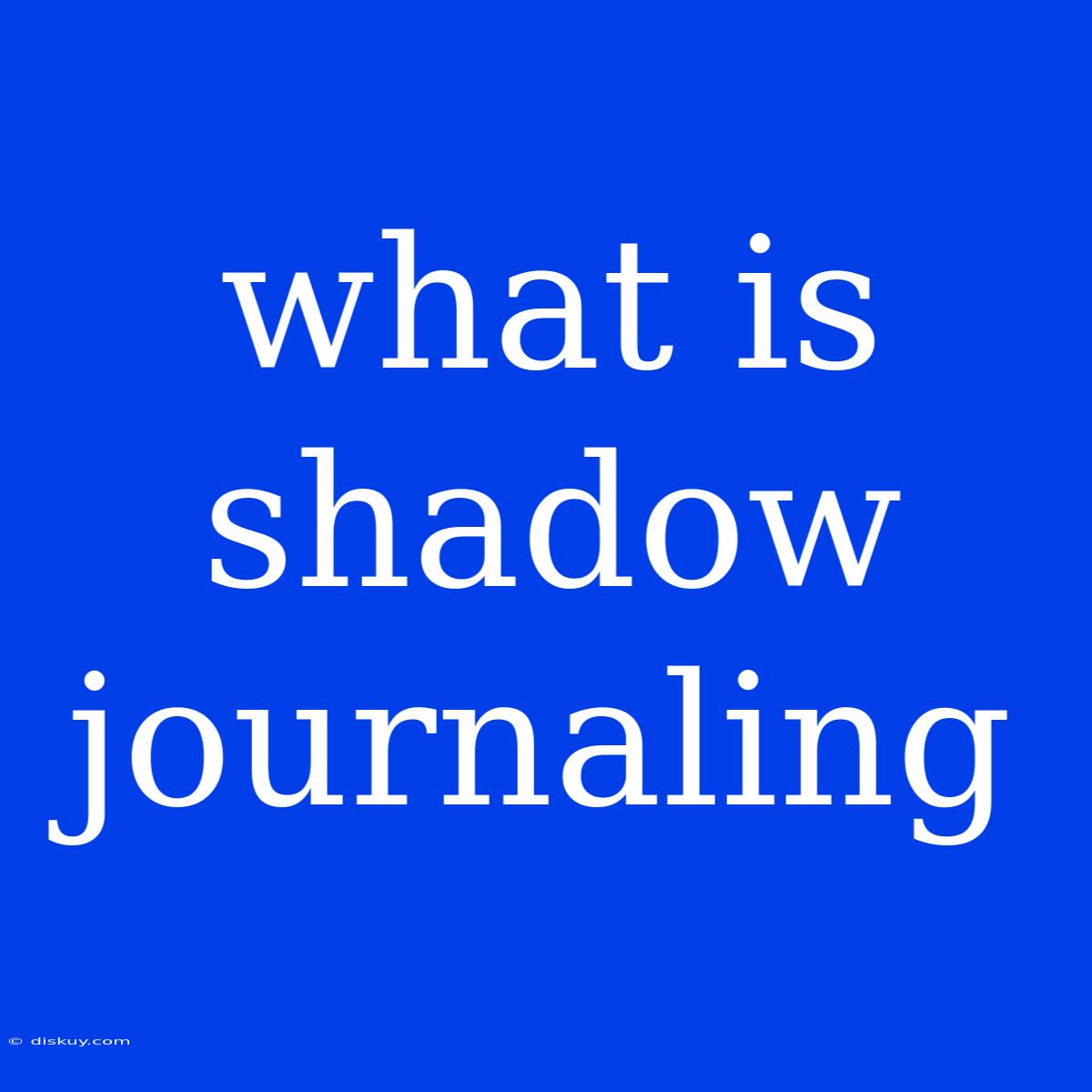Unlocking the Power of Shadow Work: What is Shadow Journaling?
Have you ever wondered about the hidden parts of yourself? The parts you might not want to admit exist, the ones that make you feel uncomfortable or ashamed? Shadow journaling is a powerful tool for exploring these hidden depths and bringing them to light.
Editor Note: Shadow journaling has gained popularity as a tool for personal growth and self-discovery. This article aims to provide a comprehensive guide to shadow journaling, explaining its purpose, benefits, and techniques.
Why is understanding your shadow self important? The shadow, according to Carl Jung, is a collection of unconscious, repressed thoughts, emotions, and impulses. It's the darker side of our personality, often containing negative traits and tendencies we try to hide. Recognizing and integrating your shadow is crucial for personal growth, allowing you to embrace your whole self and achieve greater authenticity.
Our analysis: We've researched various sources and expert opinions to compile this guide to shadow journaling. We'll explore its purpose, benefits, and techniques, making it easier for you to understand and incorporate this practice into your life.
Key Insights on Shadow Journaling:
| Insight | Description |
|---|---|
| Purpose | To bring unconscious aspects of the self to awareness, enabling self-understanding and acceptance. |
| Benefits | Fosters self-awareness, reduces self-criticism, promotes emotional regulation, enhances creativity, and cultivates compassion. |
| Techniques | Guided writing prompts, journaling exercises, dream analysis, and shadow work with a therapist. |
| Important Note | It is crucial to approach shadow journaling with awareness and self-compassion. It can be a challenging but ultimately rewarding experience. |
Shadow Journaling Explained
Shadow journaling is a deliberate practice of exploring your shadow self through written expression. It involves confronting your hidden thoughts, emotions, and impulses and analyzing them with curiosity and honesty.
Key Aspects of Shadow Journaling
- Unmasking Hidden Patterns: It helps identify recurring negative thoughts, behaviors, or emotions that you might try to repress.
- Emotional Regulation: By acknowledging and processing suppressed emotions, shadow journaling can contribute to emotional stability and self-regulation.
- Developing Self-Compassion: Understanding your shadow self can lead to greater acceptance and compassion for your flaws and imperfections.
- Embracing Authenticity: It encourages you to embrace your whole self, both light and dark, leading to greater self-acceptance and authenticity.
Delving Deeper: Techniques and Exercises
Guided Writing Prompts
- "What are my biggest fears?"
- "What am I trying to hide from myself?"
- "What are my darkest desires?"
- "What qualities do I judge in others?"
- "What are my biggest regrets?"
Journaling Exercises
- Write a letter to your shadow self.
- Create a list of your shadow traits.
- Explore how your shadow manifests in your life.
- Write about a situation where you acted impulsively or irrationally.
- Imagine your shadow self as a physical character; describe them.
Dream Analysis
- Record your dreams and analyze them for recurring themes or symbols.
- Explore how these dreams might be connected to your shadow self.
FAQ: Understanding Shadow Journaling
Q: What if I discover something really dark about myself? A: It's important to remember that your shadow is a part of you, and it doesn't define who you are. Be kind to yourself as you explore these aspects, and seek support if needed.
Q: Will shadow journaling make me more negative? A: No, the opposite is true. By bringing your shadow into conscious awareness, you can start to manage and overcome negative tendencies.
Q: Is shadow journaling dangerous? A: Shadow journaling can be intense, so it's important to approach it with awareness and self-compassion. If you experience overwhelming emotions, seek professional support.
Q: How often should I shadow journal? A: There is no set frequency. Start with a few times a week and adjust the rhythm based on your needs and comfort level.
Tips for Effective Shadow Journaling
- Create a safe and comfortable space for journaling.
- Write freely, without censoring yourself.
- Be honest and non-judgmental with yourself.
- Focus on understanding, not fixing.
- Take breaks when needed and practice self-compassion.
Summary: Embracing the Whole Self
Shadow journaling is a powerful tool for personal growth and self-discovery. By exploring your shadow self, you can gain a deeper understanding of yourself, increase self-acceptance, and embrace your whole being. Remember to approach this practice with awareness, curiosity, and compassion.
Closing Message: Embrace the darkness, for it is in the shadows that we discover the true light of our being.

